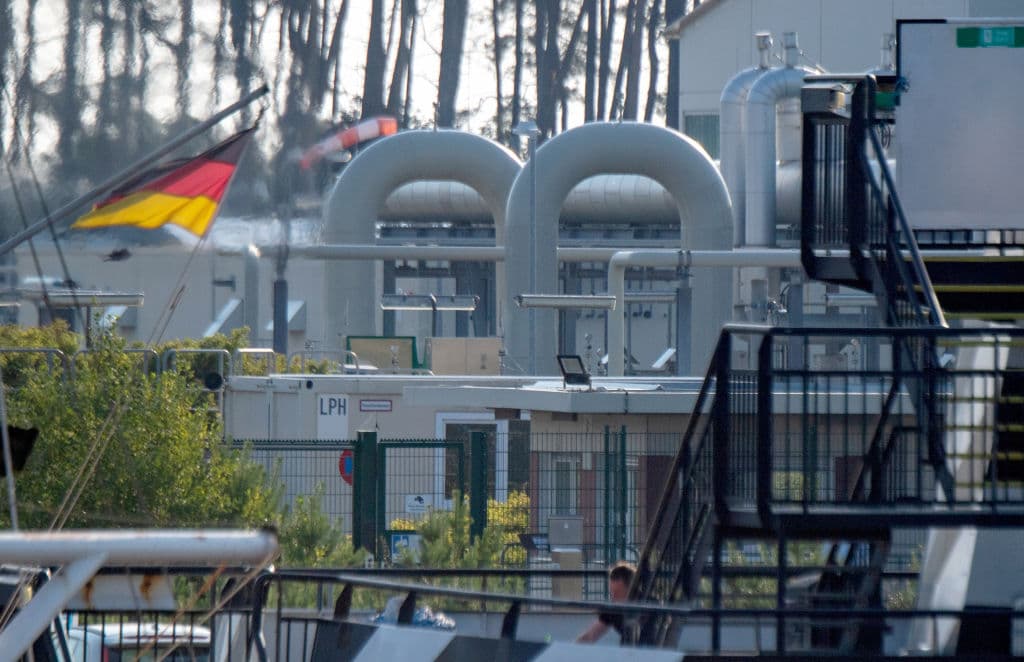Russia turns gas back on, but Europe’s energy crisis persists

As Russia wages its war in Ukraine, it also continues to weaponize its energy resources, throwing the European continent into one of the worst energy crises in decades.
After 10 days of waiting to see if Russia would resume gas supplies through the Nord Stream pipeline, the main route of gas transport from Russia to Germany, following scheduled maintenance and fears among European leaders that gas flows would be cut indefinitely, Russian natural gas began flowing on July 21, although at a reduced volume.
The resumed gas flows are only back to the 40% capacity Russia cut them to in mid-June.
Klaus Müller, president of Germany's energy regulator, the Federal Network Agency, wrote on Twitter that “unfortunately, the political uncertainty and the 60% cut from mid-June remain.”
Amid the mounting energy crisis, the European Commission on July 20 announced emergency legislation allowing it to impose 15% gas consumption cuts over the next two years. The target is voluntary through March, but in the event of a severe risk of shortages could become mandatory.
Though Russia has denied any foul play, EU Commission President Ursula von der Leyen has said that Russia is blackmailing Europe.
“Russia is using energy as a weapon,” she said.
Lower gas supplies have sent Europe into crisis mode as businesses powered by Russian energy, especially in heavily Russian gas-reliant Germany, are at risk of shutting down.
The crisis has laid bare just how deep Europe’s dependency on Russian gas and energy sources runs, and to what extent this reliance has allowed Russia to put pressure on the West in retaliation for sanctions.
“This is the part of a huge hybrid war of Russia against Europe,” Sergiy Makagon, CEO of Gas Transmission System Operator of Ukraine, told the Kyiv Independent.
Successful blackmail
Russia knows how to use energy as a weapon to effectively pressure Western leaders, Makagon said. Canada’s decision in mid-July to return the repaired turbine for the Nord Stream pipeline to Germany despite strong opposition from Ukraine was a clear example the pressure is working.
Russia initially sent the turbine to Siemens Canada for a scheduled overhaul but the equipment was blocked from being shipped back to Germany due to sanctions, after which Russia cut gas supplies to Europe by 60%. Russia blamed the sanctions for the cut, saying that it needed the turbine stuck in Canada back, as four of its other turbines also broke down.
Ukraine’s Foreign Ministry called Russia’s claims bogus. Ukrainian energy expert Mykhailo Honchar said Russia’s claims were a “fairy tale.” “No expert will believe four Siemens turbines fail at the same time,” he said.
After weeks of deliberations over whether or not returning the turbine would violate sanctions and repeated calls from Germany for Canada to return the turbine, Ottawa made the decision to return it in mid-July.
Canadian Minister of Natural Resources Jonathan Wilkinson said the move was aimed to prevent the mounting gas crisis from spiraling out of control.
But Oleksandr Kharchenko, managing director of the Energy Industry Research Center, a research and consulting firm in Kyiv, said the decision to return the equipment sent a dangerous message to Moscow: blackmail works.
After the decision, President Volodymyr Zelensky said that “Ukrainians will never accept Canada’s decision regarding the Nord Stream turbine, which was handed over to Germany in violation of the sanctions regime.”
"Russia is deliberately blackmailing (Europe) with gas and provoking violations of sanctions," Zelensky said.
Once the decision was made to send the turbine back to Russia, Moscow turned the tap back on, but only to a capacity of around 30%.
After being sent to Russia via Germany, it was reported on July 21 that the turbine was being held up in Germany because Russia had not yet provided the necessary documentation to allow its delivery. No further developments have been reported so far.
Long-term relationship
Europe’s dependence on Russian gas has a long history.
When the Soviet Union collapsed, Russia made an offer Europe couldn’t resist: cheap and readily available natural gas that would flow directly from Russia to the European continent.
Both European countries and Russia saw an opportunity to grow their economies.
Germany, Europe’s economic powerhouse, began to buy gas supplies from the Soviet Union 50 years ago, ever since the astonishing wealth of Russian oil and gas resources was discovered. By 1989 when the Berlin Wall came down, the Soviet Union already made up about one-third of all gas demand in West Germany.
Before Russia’s all-out war against Ukraine, 55% of Germany’s gas imports came from Russia. That number has since dropped to 35%, according to Economy Minister Robert Habeck.
Germany became hugely reliant on Russian energy imports on former German Chancellor Angela Merkel’s watch, who was often criticized for her policy of detente toward Moscow.
Unwinding years of energy dependency on Russia would be a colossal challenge. This is especially the case for Germany, whose entire economic model is based on manufacturing, cheap Russian gas, and a shutdown of nuclear energy that Berlin is unlikely to reverse.
Europe is looking elsewhere to source much-needed gas. On July 18, European Commission President Ursula von der Leyen signed a deal with Azerbaijani President Ilham Aliyev to bring imports of Azeri natural gas to “at least” 20 billion cubic meters per year in 15 years, doubling the current supply through the Southern Gas Corridor.
Over concerns about the country’s ability to heat homes and keep factories running in the winter, the German government will require storage to be 95% full by November, up from the previous level of 90%, Bloomberg reported, citing a statement by Habeck.
But any alternative sources are a long way out and the reductions in gas supplies have Europe in a bind. European leaders have set gas storage targets in preparation for any full shutdown of gas deliveries from Russia, but with the existing reduction, those targets seem increasingly hard to meet.










